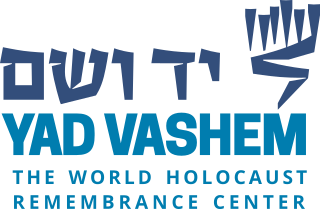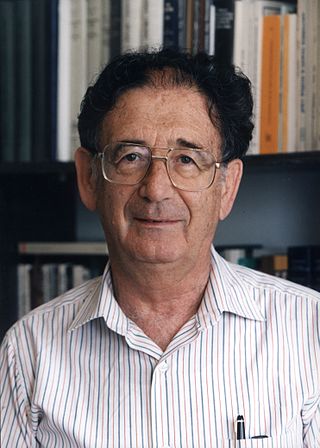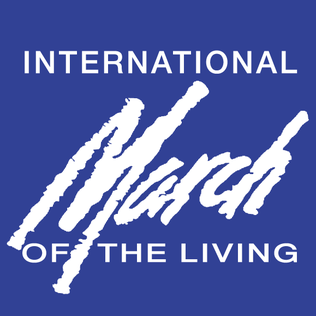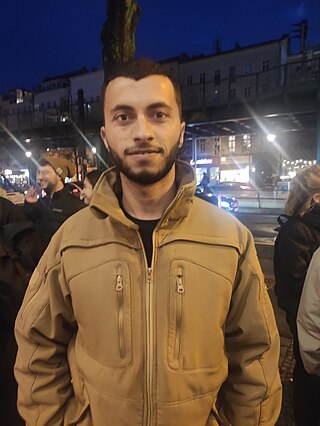Related Research Articles
Antisemitism is hostility to, prejudice towards, or discrimination against Jews. This sentiment is a form of racism, and a person who harbours it is called an antisemite. Primarily, antisemitic tendencies may be motivated by negative sentiment towards Jews as a people or by negative sentiment towards Jews with regard to Judaism. In the former case, usually presented as racial antisemitism, a person's hostility is driven by the belief that Jews constitute a distinct race with inherent traits or characteristics that are repulsive or inferior to the preferred traits or characteristics within that person's society. In the latter case, known as religious antisemitism, a person's hostility is driven by their religion's perception of Jews and Judaism, typically encompassing doctrines of supersession that expect or demand Jews to turn away from Judaism and submit to the religion presenting itself as Judaism's successor faith—this is a common theme within the other Abrahamic religions. The development of racial and religious antisemitism has historically been encouraged by the concept of anti-Judaism, which is distinct from antisemitism itself.

Yad Vashem is Israel's official memorial to the victims of the Holocaust. It is dedicated to preserving the memory of the Jews who were murdered; echoing the stories of the survivors; honoring Jews who fought against their Nazi oppressors and gentiles who selflessly aided Jews in need; and researching the phenomenon of the Holocaust in particular and genocide in general, with the aim of avoiding such events in the future. Yad Vashem's vision, as stated on its website, is: "To lead the documentation, research, education and commemoration of the Holocaust, and to convey the chronicles of this singular Jewish and human event to every person in Israel, to the Jewish people, and to every significant and relevant audience worldwide."

Yehuda Bauer is a Czech-born Israeli historian and scholar of the Holocaust. He is a professor of Holocaust Studies at the Avraham Harman Institute of Contemporary Jewry at the Hebrew University of Jerusalem.

The March of the Living is an annual educational program which brings students from around the world to Poland, where they explore the remnants of the Holocaust. On Holocaust Memorial Day observed in the Jewish calendar, thousands of participants march silently from Auschwitz to Birkenau.
Manfred Gerstenfeld was an Austrian-born Israeli author and chairman of the steering committee of the Jerusalem Center for Public Affairs. He founded and directed the center's post-Holocaust and anti-Semitism program.

The International Holocaust Remembrance Day, or the International Day in Memory of the Victims of the Holocaust, is an international memorial day on 27 January that commemorates the victims of the Holocaust, which resulted in the genocide of one third of the Jewish people, along with countless members of other minorities by Nazi Germany between 1933 and 1945, an attempt to implement its "final solution" to the Jewish question. 27 January was chosen to commemorate the date when the Auschwitz concentration camp was liberated by the Red Army in 1945.
Holocaust survivors are people who survived the Holocaust, defined as the persecution and attempted annihilation of the Jews by Nazi Germany and its allies before and during World War II in Europe and North Africa. There is no universally accepted definition of the term, and it has been applied variously to Jews who survived the war in German-occupied Europe or other Axis territories, as well as to those who fled to Allied and neutral countries before or during the war. In some cases, non-Jews who also experienced collective persecution under the Nazi regime are considered Holocaust survivors as well. The definition has evolved over time.
The Journal of Genocide Research is a quarterly peer-reviewed academic journal covering studies of genocide. Established in 1999, for the first six years it was not peer-reviewed. Since December 2005, it is the official journal of the International Network of Genocide Scholars. Previous editors have been Henry R. Huttenbach, Dominik J. Schaller, and Jürgen Zimmerer. The journal is abstracted and indexed in Political Science Abstracts, Historical Abstracts, and America: History and Life. As of 2022, the journal is published by Routledge and the editor-in-chief is A. Dirk Moses.

The Van Leer Jerusalem Institute (VLJI) is a center for the interdisciplinary study and discussion of issues related to philosophy, society, culture, and education. The Institute was established in order to create a body of knowledge and discourse and to give expression to the wide range of disciplines and opinions in Israel. The contribution of a core of renowned scholars facilitates the implementation of reforms and new approaches in various social spheres.

A bilateral relationship exists between Armenia and Israel. From 1993 to 2007, Armenia was served by the Embassy of Israel in Georgia. In 1996, Tsolak Momjian was appointed the honorary consul of Armenia in Jerusalem. Eleven years later, the residence of the Embassy of Israel in Armenia was moved to Jerusalem. In October 2010, Shmuel Meirom was appointed the Israeli ambassador to Armenia. Armen Melkonian was appointed the Armenian ambassador to Israel in 2012, with a residence in Cairo. In October of that year, Melkonian presented his credentials to Israeli President Shimon Peres. On 21 September 2019 Armenia announced that it would be opening an embassy in Israel. Despite generally cordial ties between the two, relations soured after Armenia withdrew its ambassador to Israel due to Israeli arms supply to Armenia's enemy, Azerbaijan, in the 2020 Nagorno-Karabakh War.
Holocaust studies, or sometimes Holocaust research, is a scholarly discipline that encompasses the historical research and study of the Holocaust. Institutions dedicated to Holocaust research investigate the multidisciplinary and interdisciplinary aspects of Holocaust methodology, demography, sociology, and psychology. It also covers the study of Nazi Germany, World War II, Jewish history, antisemitism, religion, Christian-Jewish relations, Holocaust theology, ethics, social responsibility, and genocide on a global scale. Exploring trauma, memories, and testimonies of the experiences of Holocaust survivors, human rights, international relations, Jewish life, Judaism, and Jewish identity in the post-Holocaust world are also covered in this type of research.
David Bankier was a Holocaust historian and head of the International Institute for Holocaust Research at Yad Vashem.
Daniel Romanovsky is an Israeli historian and researcher who has contributed to the study of the Holocaust in the Soviet Union under German occupation in World War II. Romanovsky was a Soviet refusenik politically active since the 1970s. Private seminars on the history of the Jews were held in his Leningrad apartment in the 1980s. Research on the topic was difficult in the Soviet Union because of government restrictions. In the 1970s and 1980s Romanovsky interviewed over 100 witnesses to the Holocaust, including Jews, Russians, and Belarusians, recording and cataloguing their accounts of the Final Solution.

Holocaust education is efforts, in either formal or informal settings, to teach about the Holocaust. Teaching and Learning about the Holocaust addresses didactics and learning, under the larger umbrella of education about the Holocaust, which also comprises curricula and textbooks studies. The expression "Teaching and Learning about the Holocaust" is used by the International Holocaust Remembrance Alliance.

Comparisons between Israel and Nazi Germany occur frequently in some veins of anti-Zionism in relation to the Israeli–Palestinian conflict. The legitimacy of these comparisons and their potential antisemitic nature is a matter of debate. Historically, figures like historian Arnold J. Toynbee have drawn parallels between Zionism and Nazism, a stance he maintained despite criticism. Scholar David Feldman suggests these comparisons are often rhetorical tools without specific antisemitic intent. The Anti-Defamation League (ADL) sees them as diminishing the Holocaust's significance.

The Jerusalem Declaration on Antisemitism (JDA) is a document meant to outline the bounds of antisemitic speech and conduct, particularly with regard to Zionism, Israel and Palestine. Its creation was motivated by a desire to confront antisemitism and by objections to the IHRA Definition of Antisemitism, which critics have said stifles legitimate criticism of the Israeli government and curbs free speech. The drafting of the declaration was initiated in June 2020 under the auspices of the Van Leer Institute in Jerusalem by eight coordinators, most of whom were university professors. Upon its completion the declaration was signed by about 200 scholars in various fields and released in March 2021.
In discussions of the Israeli–Palestinian conflict, the Holocaust and the Nakba have come to be regarded as interrelated events, both historically and in the way these two tragedies have influenced perceptions of the conflict by both parties. In Israel, all Israeli Jews are considered survivors of the Holocaust who must implement the imperative of never again in regards to being a Jewish victim. The uniqueness of the Holocaust is emphasized and any linkage between the Holocaust and the Nakba is rejected. The 2018 book The Holocaust and the Nakba argues that "unless we can hold these two moments in our hearts and minds as part of the same story, there can be no moving forward in the seemingly unmovable conflict that is Israel-Palestine".

Basel Adra is a Palestinian activist and journalist who in 2021 was falsely accused of framing the Israel Defense Forces (IDF) and who in 2022 was beaten while filming the IDF demolishing a structure that he built. He co-wrote and co-directed the 2024 documentary film No Other Land, which premiered at the 74th Berlin International Film Festival, at which it won two best-documentary awards.
Zionist antisemitism or antisemitic Zionism refers to a phenomenon in which antisemites express support for Zionism and the State of Israel. In some cases, this support may be promoted for explicitly antisemitic reasons. Historically, this type of antisemitism has been most notable among Christian Zionists, who may perpetrate religious antisemitism while being outspoken in their support for Jewish sovereignty in Israel due to their interpretation of Christian eschatology. Similarly, people who identify with the political far-right, particularly in Europe and the United States, may support the Zionist movement because they seek to expel Jews from their country and see Zionism as the least complicated method of achieving this goal and satisfying their racial antisemitism.
References
- ↑ "Prof. Amos Goldberg". The Van Leer Jerusalem Institute. Retrieved 17 April 2022.
- ↑ Welle (www.dw.com), Deutsche. "The Jerusalem Declaration: redefining antisemitism? | DW | 17.06.2021". DW.COM. Retrieved 17 April 2022.
- ↑ Project, The Palestine (2024-04-18). "Yes, it is genocide". Medium. Retrieved 2024-04-28.
- ↑ מקומית, שיחה (2024-04-17). "כן, זה רצח עם". שיחה מקומית (in Hebrew). Retrieved 2024-04-29.
- ↑ Gilbert, Shirli (April 2019). "Amos Goldberg, Trauma in First Person: Diary Writing During the Holocaust". Psychoanalysis and History. 21 (1): 127–130. doi:10.3366/pah.2019.0288.
- ↑ Budryte, Dovile (2021). "Trauma in First Person: Diary Writing During the Holocaust by Amos Goldberg (review)". Holocaust and Genocide Studies. 35 (1): 106–108. ISSN 1476-7937.
- ↑ "Trauma in First Person". Reading Religion.